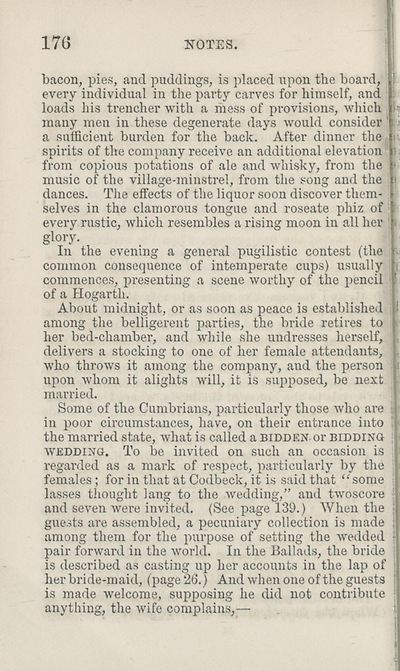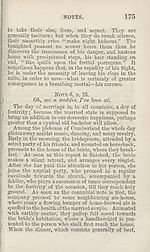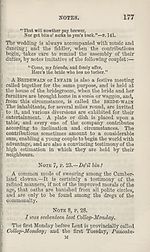Download files
Complete book:
Individual page:
Thumbnail gallery: Grid view | List view

176
NOTES.
bacon, pies, and puddings, is placed upon the board,;
every individual in the party carves for himself, and j
loads his trencher with a mess of provisions, which ,
many men in these degenerate days would consider
a sufficient burden for the back. After dinner the *
spirits of the company receive an additional elevation!
from copious potations of ale and whisky, from the
music of the village-minstrel, from the song and the j
dances. The effects of the liquor soon discover them¬
selves in the clamorous tongue and roseate phiz of !
every rustic, which resembles a rising moon in all her
glory. I
In the evening a general pugilistic contest (the,
common consequence of intemperate cups) usually
commences, presenting a scene worthy of the pencil
of a Hogarth.
About midnight, or as soon as peace is established
among the belligerent parties, the bride retires to
her bed-chamber, and while she undresses herself,
delivers a stocking to one of her female attendants,
who throws it among the company, and the person
upon whom it alights will, it is supposed, be next
married.
Some of the Cumbrians, particularly those who are
in poor circumstances, have, on their entrance into
the married state, what is called a bidden-or bidding
wedding. To be invited on such an occasion is
regarded as a mark of respect, particularly by the
females; for in that at Codbeck, it is said that “ some
lasses thought lang to the wedding,” and twoscore
and seven were invited. (See page 139.) When the
guests are assembled, a pecuniary collection is made
among them for the purpose of setting the wedded
pair forward in the world. In the Ballads, the bride
is described as casting up her accounts in the lap of
her bride-maid, (page 26.) And when one of the guests
is made welcome, supposing he did not contribute
anything, the wife complains,—
NOTES.
bacon, pies, and puddings, is placed upon the board,;
every individual in the party carves for himself, and j
loads his trencher with a mess of provisions, which ,
many men in these degenerate days would consider
a sufficient burden for the back. After dinner the *
spirits of the company receive an additional elevation!
from copious potations of ale and whisky, from the
music of the village-minstrel, from the song and the j
dances. The effects of the liquor soon discover them¬
selves in the clamorous tongue and roseate phiz of !
every rustic, which resembles a rising moon in all her
glory. I
In the evening a general pugilistic contest (the,
common consequence of intemperate cups) usually
commences, presenting a scene worthy of the pencil
of a Hogarth.
About midnight, or as soon as peace is established
among the belligerent parties, the bride retires to
her bed-chamber, and while she undresses herself,
delivers a stocking to one of her female attendants,
who throws it among the company, and the person
upon whom it alights will, it is supposed, be next
married.
Some of the Cumbrians, particularly those who are
in poor circumstances, have, on their entrance into
the married state, what is called a bidden-or bidding
wedding. To be invited on such an occasion is
regarded as a mark of respect, particularly by the
females; for in that at Codbeck, it is said that “ some
lasses thought lang to the wedding,” and twoscore
and seven were invited. (See page 139.) When the
guests are assembled, a pecuniary collection is made
among them for the purpose of setting the wedded
pair forward in the world. In the Ballads, the bride
is described as casting up her accounts in the lap of
her bride-maid, (page 26.) And when one of the guests
is made welcome, supposing he did not contribute
anything, the wife complains,—
Set display mode to:
![]() Universal Viewer |
Universal Viewer | ![]() Mirador |
Large image | Transcription
Mirador |
Large image | Transcription
| Antiquarian books of Scotland > Poetry > Ballads in the Cumberland dialect > (180) |
|---|
| Permanent URL | https://digital.nls.uk/125707375 |
|---|
| Description | Thousands of printed books from the Antiquarian Books of Scotland collection which dates from 1641 to the 1980s. The collection consists of 14,800 books which were published in Scotland or have a Scottish connection, e.g. through the author, printer or owner. Subjects covered include sport, education, diseases, adventure, occupations, Jacobites, politics and religion. Among the 29 languages represented are English, Gaelic, Italian, French, Russian and Swedish. |
|---|

